How Bad Is The Compilation of Final Fantasy VII Actually? Part 1: The OVAs, Light Novel, and Advent Children
By ZombiePie 22 Comments
Intro
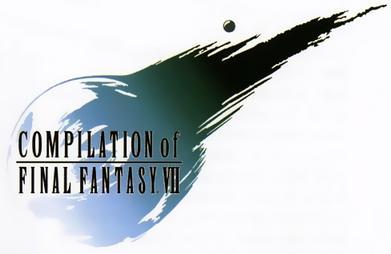
It has been a while since I last discussed a Final Fantasy game on Giant Bomb, and that disappointing tradition continues this week. One of the most frequent requests I have seen on my last handful of blogs is for an exhaustive close reading of Final Fantasy VII Remake. While I'm not discounting this premise as being outside the realm of possibility, I do wish to "ease into" the remake before looking over it with a fine-tooth comb. With news of "Part 2" looming in the background, Square-Enix has made a handful of "exciting" announcements about Final Fantasy VII Remake's place in the "Compilation of Final Fantasy VII." Despite initial fan speculation, Square-Enix has made it clear Final Fantasy VII Remake is indeed a "valued part" of the mainline Final Fantasy VII franchise.
While some expressed surprise at this announcement, those who have followed Square's handling of the Final Fantasy VII IP, myself included, couldn't help but sigh "Here we go again...." For those unaware, Square-Enix has been tinkering with Final Fantasy VII for the past fifteen years, and I'm not just talking about video game prequels and sequels. The "Compilation of Final Fantasy VII" is a massive multi-media endeavor that includes books, mobile games, and original video animations (i.e., OVAs). The "peak" of this effort took place between 2004 and 2009. As always, you can never fault Square-Enix for their ambition. That Square-Enix thought they could make a console game, handheld game, mobile game, full-length film, and two animes, all within FIVE YEARS, is simply astounding! But the mad bastards at Square-Enix managed to pull it off, though the results often were questionable at best.
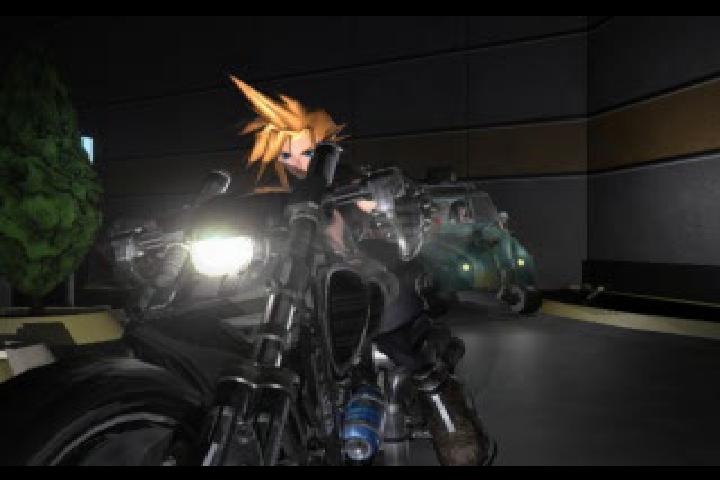
This month, I'll be reviewing the THREE video entries in the Compilation of Final Fantasy VII. While most people are aware of Advent Children, many forget that Square-Enix made two attempts at a Final Fantasy VII anime! Those experiments were: Last Order: Final Fantasy VII and Final Fantasy VII: On the Way to a Smile "Episode Denzel." These works are fascinating specimens exhibiting the worst of Square-Enix's hubris during the late 2000s and early 2010s. As we will witness, Square-Enix thought HIGHLY of their writing prowess and felt up to tackle every possible media type with the same tired and true trope-laden characters. And this particular style and format permeated every facet of the Compilation of Final Fantasy VII until the release of Final Fantasy VII Remake, but more on that shortly.
Lastly, it bears mentioning where I stand regarding Square-Enix's pre-Remake Final Fantasy VII-based projects: I hate them. I think this era of Square-Enix set the company creatively backward for an entire console generation, a setback they are only now starting to reverse. The company's cockiness clouded the Fabula Nova Crystallis universe and the original version of Final Fantasy XIV. Worse, the company's heavy reliance on a handful of storytelling tropes and idioms led to a ten-year span in which their narratives repeated the same plot beats and templates. Everything had the same dower monochromatic goth-punk look and emotional tone, and I found Square-Enix one of the most frustrating companies to follow during this time. They had some of the best technology and staff in the industry but were spurting out the same aesthetic over and over again. I dare anyone to look at random environmental screencaps pulled from Advent Children, Crisis Core, Dirge of Cerberus, and Final Fantasy XIII and see if you can guess the pictures' source correctly 100% of the time. But with that out of the way, let's see if my bitterness is "justified."
Movie #1: Last Order: Final Fantasy VII
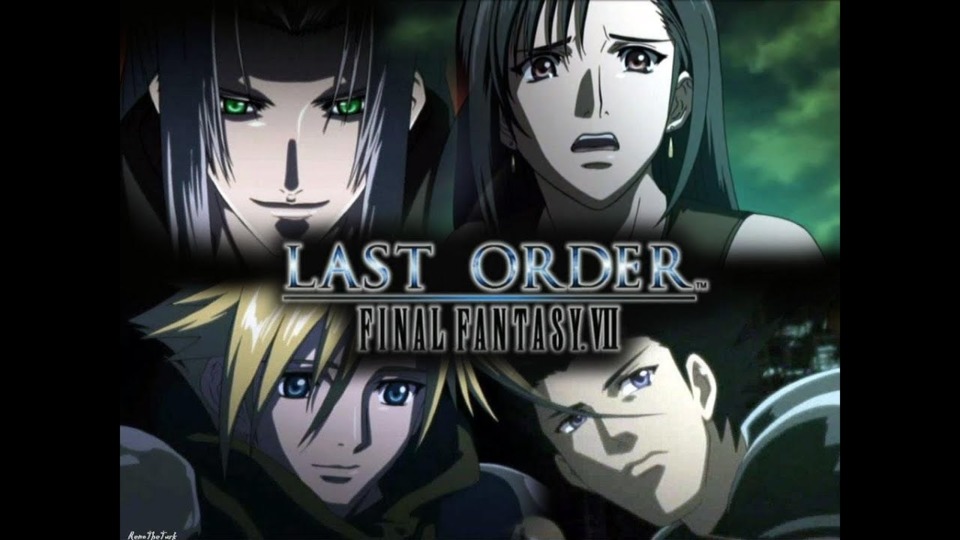
I can almost predict what many of you are about to yell at the top of your lungs. "But ZombiePie, Last Order isn't canon because it fucked up Zack's death scene!" And you know what? You would be correct, but Square-Enix has an odd relationship with Last Order that is almost worth remarking upon alone. But, yes, immediately after the OVA released, Square-Enix decanonized it because of its numerous discrepancies with established Final Fantasy VII lore. To its defense, the short film was made in about seven months and planned from the get-go to be a tie-in to a mobile game (i.e., Before Crisis). Where things get interesting is when you read about Tetsuya Nomura's relationship to Last Order. The divisive figure approved all of its deviations from canon and fell in love with its premise so much it inspired him to make Crisis Core. Essentially, the higher-ups at Square knew this thing was a narrative trainwreck, but they couldn't fix anything because the director of the franchise thought it "looked cool."
"Fanwankery" is the best way to describe the Last Order to anyone who has never seen it. The premise is relatively straightforward, and the only thing holding its tenuous story together is its flashy action scenes and over the top aesthetical choices. It starts rather innocuously with the Turks' leader, Tseng, narrating an official report on the "Nibelheim Incident." What proceeds next is an odd mishmash between a by the numbers account of well-established Final Fantasy VII lore and typical anime nonsense. Tifa gets more screentime during this version of Nibelheim's razing, and Cloud doesn't come into the picture until the OVA's midpoint. Now, let's return to the fact this film is in service of a mobile game starring the Turks. It is worth mentioning that Tetsuya Nomura LOVES the Turks. The reason this is important is that this OVA is 50% a flashback, and 50% Tseng lecturing on about his report. The latter is about as exciting as watching paint dry, and the "culminating event" is a cutaway introducing the characters of Before Crisis.
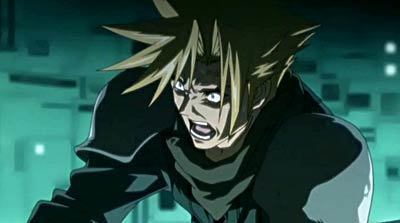
But what makes Last Order fascinating is how it fucks up trying to recreate cutscenes from Final Fantasy VII. I want to be very clear; I have neither the patience nor level of care to itemize every inconsistency between Last Order and Final Fantasy VII. I could not care less that the Shinra uniforms in the OVA do not perfectly match the ones in the game, or Zack's hair faces the wrong direction. Still, there are two "errors" on the part of Madhouse that stand out as being downright egregious. The first of which is how the Last Order depicts how Cloud defeated Sephiroth. As most of you already know, in Final Fantasy VII, Sephiroth has his fall from grace and offs Tifa and Zack with relative ease. Cloud, who is dramatically revealed to be an ordinary Shinra soldier, tosses Sephiroth into the Lifestream after being stabbed through his chest. In Last Order, Sephiroth stabs Cloud through the chest, but Cloud promptly pulls the sword out of his body and tosses it to the side. Sepiroth responds to this feat of strength by grabbing Jenova's head and willingly jumping into the Lifestream.
This difference might not sound like much on paper, but anyone who has played Final Fantasy VII can attest the OVA's version is a major "bummer." In the original version, Cloud is allowed to beat Sephiroth despite being an average person. However, in Last Order, he is deprived of this small victory as his hometown burns to the ground. NONETHELESS, this quibble PALES in comparison to how thoroughly Madhouse fucked up Zack's death. To Madhouse's credit, the conclusion to this OVA is their one attempt at an original idea. As seen in Last Order, Zack and Cloud are on the run from Shinra's forces. As they hitch a ride on a truck, Zack falls into the lens of a sniper scope. The screen goes black, Zack tells Cloud to duck, and a gunshot rings before the credits roll. The implication here is that Zack died at the hand of a single sniper rather than a mob of Shinra soldiers. This one mistake forced Square-Enix to issue a press statement after a fan outcry following its released. How this debuted with such a fundamental error, with Nomura playing a critical role in its development, is astounding.
Recommendation: AVOID; This is mostly a shot-for-shot remake of Final Fantasy VII. The few attempts at creativity either do nothing or change the original events' tone for the worse. This "recommendation" is likely one of the easiest I will have until we get to Dirge of Cerberus.
Movie #2: Final Fantasy VII Advent Children Complete
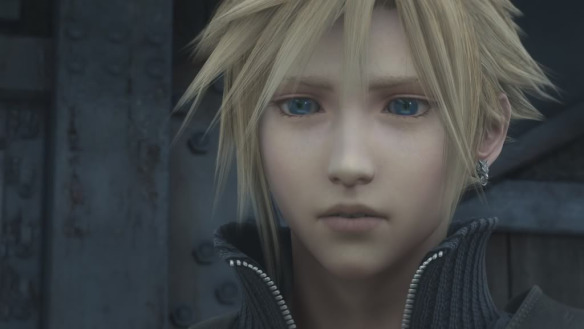
We have now arrived at the "main event." No examination of the "Compilation of Final Fantasy VII" is complete without discussing Advent Children. For those who remember my Final Fantasy VII Remake predictions blog from ages ago, you know I maintain a significant distaste for Advent Children. I understand for most; the film is a high-budget work of fanservice and a technical masterpiece even by today's standards. I will not deny saying: "Oh, that's cool," or "Fuck yeah," when I reached the scene where the characters perform their Limit Breaks and various summons. That said, those moments are too few and far between, and the emotional tone of the movie is downright off-putting. That last quibble is the real sticking point for me. Advent Children sent Square-Enix down a dark path when it came to the narratives of their major productions. For a solid decade after Advent Children, every game Square-Enix touched had aesthetic choices that reeked "peak Nomura." In terms of storytelling, they repeated the same formula of relying on angst and emotional breakdowns to build sympathy for their characters, especially their leather-bound and belt-covered protagonists.
Maybe you like angsty teenagers covered in zippers and belts! And you know what? That's fine! Square-Enix made a quality game for you, and it is called The World Ends with You. Where I get a bit cross with Advent Children, in particular, is how it relies on the emotional regression of established characters and wipes them of their personalities. Case in point, Advent Children's version of Cloud is downright infuriating. He spends over half the film blowing off his friends and acting like a complete tool to Tifa. Not enough is done to justify this character break, and before you know it, Cloud is back to being the "normal" goofball we all know and love. Despite the movie clocking in at over two hours, the characters evolve as if they are in an animated short film with major "swings" in the span of a single scene. There will likely be a handful of you who reply that Cloud is under Sephiroth's influence thanks to him getting infected with the Geostigma virus. Which, sure, that's what Square-Enix wants you to think, but I'm not buying into the idea that Sephiroth's space jizz made Cloud into an Evanescence listening Goth. Watching Cloud devolve as a character is the most unpleasant part of Advent Children, and you have to put up with it for HOURS!

And let's return to the claim that Advent Children is a love letter to fans of Final Fantasy VII and should be given some slack for being "harmless fun." Honestly, I don't buy that argument either. Advent Children is not an authentic expression of thanks to Final Fantasy VII fans. This movie is just Nomura and Kitase pulling out their Final Fantasy VII coloring books and using millions of dollars to actualize their fan art. What other justification is there for Reno and Rude's comedy act getting more screentime and spoken lines than Barret, Yuffie, Cid, and Vincent combined! And then we have the "new additions" to the wonderful world of Advent Children! We have Kadaj and his emo-punk biker gang, and Denzel, the orphan that always looks as if he's on the verge of bursting into tears. None of these characters feel especially memorable, and in Kadaj's case, he boils down to being a Deus ex Machina that allows Cloud to fight Sephiroth. In Denzel's case, you have to deal with a whiny brat for the better part of an hour.
Oh, and let's talk about Advent Children's run-time! For those of you who watched the film when it first came out, you may recall when Advent Children clocked in at about 110 minutes. Square-Enix, in their GRAND WISDOM, thought what Advent Children needed all along were MORE scenes involving Reno and Rude being goofballs and Denzel being a confused crybaby. As a result, the only version of Advent Children you can watch today is the "Complete" edition, which measures at around two hours and six minutes. The "additional scenes" here include cutscenes from Crisis Core, including the game's ending, which have NOT been touched up at all and stick out like a sore thumb. There is also an absurd number of static, dialogue-less, establishing environmental shots that drag down the pacing of Advent Children. So, even if you want to watch Advent Children for its well-choreographed action scenes, you have to circumnavigate even MORE FLUFF than ever before! It is yet another example of the lack of discipline that permeated Square-Enix during this era.
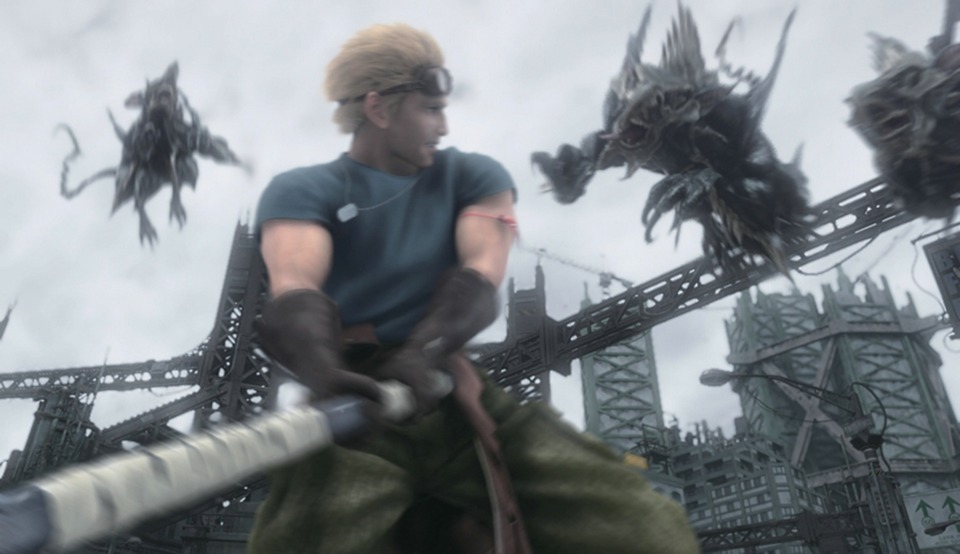
Recommendation: Vaya con dios. Despite this retrospective cementing my feelings that it did more damage than good, there's no denying that most people have made up their minds when it comes to Advent Children. If you turn to it for mindless fanservice, it still delivers a handful of thrills and riveting moments. However, I cannot help but wonder if that was possible without recontextualizing the characters we know and love for the worse. Also, I find the grey and beige world of Advent Children to be utterly uninspired.
Movie #3: Final Fantasy VII: On the Way to a Smile "Episode Denzel"
Alright, so let's get one thing squared away before we continue. Final Fantasy VII: On the Way to a Smile started as an anthology of short stories that coincided with Final Fantasy VII: Advent Children Complete. Advent Children Complete came packaged with an animated version of the Denzel episode of this light novel. This episode was helmed by animation studios A-1 Pictures and BeStack. It is approximately 28 minutes long, stars everyone's favorite Advent Children character Denzel, and contributes absolutely NOTHING of consequence to the Final Fantasy VII canon. Seriously, unless you want to listen to Denzel talk to Reeve Tuesti, for TWENTY GODDAMN MINUTES about how much he misses his parents, there is NOTHING IN THIS THING FOR YOU!
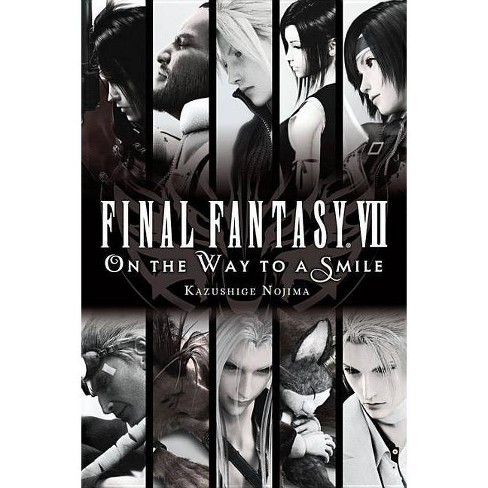
Maybe, if you are one of the few people who like Dirge of Cerberus, this OVA piques your interest as it introduces the World Regenesis Organization and other key terms from that game. Beyond that, its run time consists of Denzel crying about watching the Sector Seven 7 plate crashing down and killing his parents. Which okay, that's a cool call back, but all the show gives you is a cheap facsimile of a scene you have seen plenty of times already, but this time around with dubious production values. Seriously, the reactor scenes in Crisis Core are more impressive than the ones in this OVA, and Crisis Core is a PSP game! There's a weird plot twist that reveals Denzel was adopted by Reeve's mother, which opens up a whole can of worms. For example, if Denzel is Reeve's adopted brother, why does Reeve allow him to suffer in Tifa's shitty orphanage in Advent Children? It's entirely unintentional, but Reeve comes across as a neglectful asshole for allowing his GODDAMN ADOPTED BROTHER to fall into a deep depressive state in the slums of Midgar. Sure, maybe he's a bit "concerned" about Denzel finding out about his habit of masquerading as a robotic cat that throws dice, but is that an excuse of letting your brother wallow alone in his misery?
If you are wondering about my recommendation regarding the light novel, let me run down each chapter's title character in chronological order: Denzel, Tifa, Barret, Red XIII, Yuffie, Rufus, Sephiroth, and Aerith. Denzel's chapter takes up about twentyish pages, and it's pure torture! In the final two chapters, you follow Sephiroth and Aerith. Instead of exploring each character's background or relationships before the events of Final Fantasy VII, which would have been interesting, you instead listen to each make idiomatic stump speeches about their vision for the future. As one would expect, Sephiroth rants about blowing up the world, and Aerith muses why that is a bad idea. That's it. That is the level of characterization you can expect in this thing.
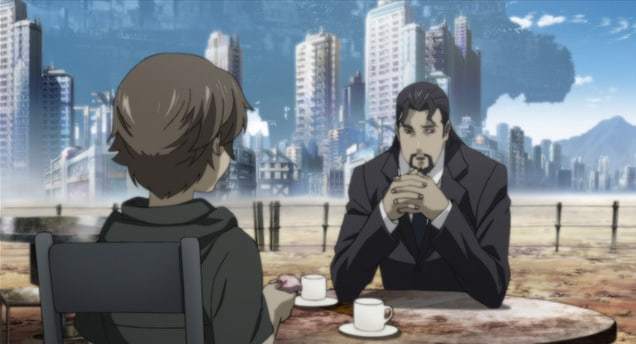
And let's return to that list of characters that headline this light novel. Let's be generous and say that learning more about one of those characters sounds appealing to you. Whether it be Tiffa, Barret, or Yuffie, I'm willing to say these supporting characters hold some nostalgic value to many of you. While this nigh 300-page novella attempts to bridge the gap between Final Fantasy VII and Advent Children, it does so in the most blase and haphazard manner possible. For example, Red XIII experiences an existential crisis in which they spend thirty goddamn pages wondering if they are human or beast. On the other hand, Yuffie spends her thirty pages running a medical clinic attending to people infected by Geostigma. The characters behave as you'd expect while the franchise lived under the shadow of Advent Children. That is to say; even the comical figures are afflicted with bouts of angst and melodrama. To highlight, Red XIII can't stop thinking about his dead grandfather, and Yuffie is the target of discrimination by her own family. So, YES, a gap has been bridged, but buyer be warned, it's a bummer both figuratively and literally!
Recommendation: AVOID; If what you want out of your media is an affirmation of your fan theories about individual characters and their post-game life choices, you could do worse. For anyone else, this will take you to "the bad place." It is questionably written, and the stink of Advent Children reeks strongly.
